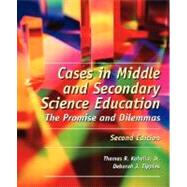
| List of Contributors | |
| Preface | |
| Classroom Case Narratives and Pedagogical and Research Tools in Science Education | |
| Adolescent Learners in Science | |
| Reform and Science Curriculum | |
| Planning for Science Instruction | |
| Organizing a Positive Learning Environment | |
| Learning in the Science Classroom | |
| Learning in the Laboratory and Informal Settings | |
| Controversial Issues in the Science Classroom | |
| The Role of Technology in Science Teaching and Learning | |
| Assessment in Science | |
| Student Teaching and Mentoring | |
| Science Teacher Education: Exploring the Paradoxes and Possibilities of Case-Based Instruction | |
| Table of Contents provided by Publisher. All Rights Reserved. |
The New copy of this book will include any supplemental materials advertised. Please check the title of the book to determine if it should include any access cards, study guides, lab manuals, CDs, etc.
The Used, Rental and eBook copies of this book are not guaranteed to include any supplemental materials. Typically, only the book itself is included. This is true even if the title states it includes any access cards, study guides, lab manuals, CDs, etc.